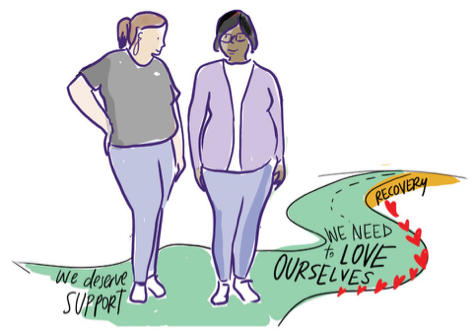Depressive Disorders
Part of the SWHR Women’s Health Dashboard
Depressive Disorders & Women’s Health
Depressive disorders are common but serious mood disorders which can affect a person’s thoughts, feelings, and ability to function. Depressive disorders include both major depressive disorder (MDD) and persistent depressive disorder, also called dysthymia. MDD (clinical depression) is defined as a period of at least two weeks of feeling low, loss of interest or pleasure in daily activities, difficulty sleeping or sleeping longer than usual, difficulty concentrating, and a range of other symptoms affecting eating, energy, and self-worth [1]. Persistent depressive disorder usually involves mild symptoms of depression that persist for longer than 2 years [2].
Depressive disorders can be caused by a multitude of factors including biology, environment, genetics, and psychology, and the severity and frequency of symptoms are highly variable from person to person. Family history of depression and major trauma or stress have been identified as common risk factors [1].
The information presented below has been curated from 2018 data, unless otherwise stated.
DISEASE BURDEN
In 2018, an estimated 9.6% of women and 7.7% of men in the United States reported that they were experiencing depression [3], with adults ages 35-54 demonstrating the highest prevalence of depression. Depression among Asian, Pacific Islander, American Indian, and Alaska Native populations were lower compared to other racial/ethnic groups [3].
Depressive disorders are one of the leading contributors to disability, and although depressive disorders are not considered a leading cause of mortality, 50% of all suicides in 2018 were attributable to MDD [4].
In 2018, the incremental costs attributed to MDD were $121 billion [4]. Medical costs, including prescription drugs, were estimated at $37 billion and indirect costs accounting for absenteeism and presenteeism were estimated at $71 billion for that same year. For every dollar spent on MDD direct costs, an additional $2.30 was spent on MDD-related indirect costs. Researchers have also found significant suicide-related costs attributable to depression totaling $13 billion in 2018 [4].
DISEASE PREVALENCE AND MORTALITY
Depression Prevalence by Sex
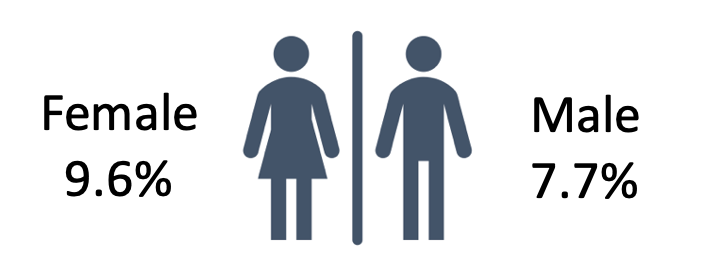
Source: Daly M, et al. (2021) [3]
Depression Prevalence by Age
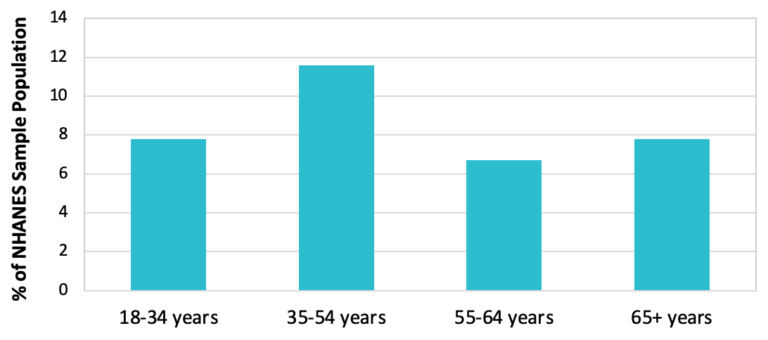
Source: Daly M, et al. (2021) [3]
Depression Prevalence by Race
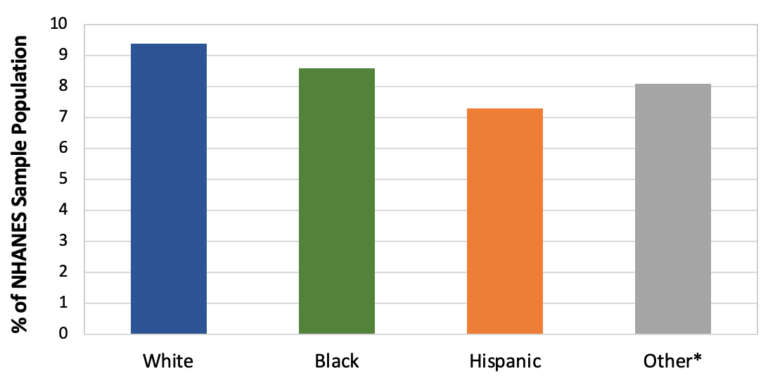
*Includes Asian, American Indian/Alaska Native, Native Hawaiian, Other Pacific Islander, and other non-Hispanic multiracial groups
Source: Daly M, et al. (2021) [3]
DOWNLOAD DEPRESSION PREVALENCE DATA (2018)
DISEASE IMPACTS AND INFLUENCES
Multiple factors contribute to incidence and morbidity for depressive disorders and its disproportional impact on women and women’s health, including but not limited to biological sex, sociocultural influences, and insurance coverage.
Research Investment
The National Institutes of Health funded $500 million in research on Depression in 2018 (1.9% of its total budget), with $107 million specific to MDD. Of the 1117 total research grants funded, 70 (6.3%) projects focused on women’s health.*
*Women’s health focus was determined by searching the following key terms – Female, Gender, Maternal, Sex, and variations of Lactating, Pregnant, Women – in the project titles of all Depression funded grants, according to the NIH Research, Condition, and Disease Categorization (RCDC) report.
DOWNLOAD THE FULL LIST OF 2018 NIH-FUNDED GRANTS FOR DEPRESSION
Health Disparities
- Illicit substance use is associated with increased risk for mental illness and mental illness is a risk factor for illicit substance use [5].
- From 2015 to 2018, there were statistically significant increases in major depressive episodes among adolescent girls aged 12-17 (19.5% to 21.5%) and young adult women aged 18-25 (13.0% to 17.6%) [5].
- Unique to women, perinatal depression is a mood disorder that can occur during a pregnancy (prenatal depression) or after giving birth (postpartum depression) [6].
Disease Burden
Disability due to depressive disorders significantly affects women of all ages. According to the World Health Organization Global Health Estimates, in 2018, depressive disorders accounted for 1,618,060 total disability-adjusted life years (DALY) lost among women 15 years and older. The highest DALY rate was among women ages 15-54, totaling 10,229 per 100,000 persons [7].
Insurance Coverage
There are significant financial costs associated with medical care for individuals with chronic disorders, such as depressive disorders. Health insurance access and coverage are important for assisting with the financial burden. Below is a table displaying the states with the 5 highest uninsured rates in 2018.
U.S. Health Insurance Coverage by State
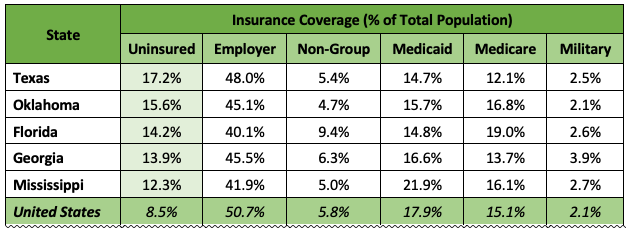
Source: Kaiser Family Foundation Health Insurance Coverage of the Total Population (CPS), 2018 [8]
Uninsured: Includes individuals without health insurance and individuals who have coverage under the Indian Health Service only.
Employer: Includes individuals covered by employer-sponsored coverage either through their own job or as a dependent in the same household.
Non-Group: Includes individuals and families that purchased or are covered as a dependent by non-group insurance.
Medicaid: Includes individuals covered by Medicaid, the Children’s Health Insurance Program (CHIP), and those who have both Medicaid and another type of coverage, such as dual eligibles who are also covered by Medicare.
Medicare: Includes individuals covered by Medicare, Medicare Advantage, and those who have Medicare and another type of non-Medicaid coverage where Medicare is the primary payer. Excludes individuals with Medicare Part A coverage only and those covered by Medicare and Medicaid (dual eligibles).
Military: Includes individuals covered under the military or Veterans Administration.
Download the full data table of U.S. Health Insurance Coverage (2018), by State
RESOURCES AND REFERENCES
Additional Resources
- CDC Depression Among Women
- Maternal Mental Health Leadership Alliance
- National Alliance on Mental Illness, Depression
- National Institute of Mental Health (NIH/NIMH), Depression
References
- Bains N, Abdijadid S. Major Depressive Disorder. 2022 Jun 1. In: StatPearls [Internet]. Treasure Island (FL): StatPearls Publishing; 2022 Jan–.
- Patel RK, Rose GM. Persistent Depressive Disorder. [Updated 2022 Jun 27]. In: StatPearls [Internet]. Treasure Island (FL): StatPearls Publishing; 2022 Jan–.
- Daly M, Sutin AR, Robinson E. Depression Reported by US Adults in 2017–2018 and March and April 2020. J Affect Disord, 2021 Jan1;278:131-135.
- Greenberg PE, Fournier AA, Sisitsky T, et al. The Economic Burden of Adults with Major Depressive Disorder in the United States (2010 and 2018). Pharmacoeconomics, 2021 Jun;39(6):653-665.
- Substance Abuse and Mental Health Services Administration. (2019). Key Substance Use and Mental Health Indicators in the United States: Results from the 2018 National Survey on Drug Use and Health (HHS Publication No. PEP19-5068, NSDUH Series H-54). Rockville, MD: Center for Behavioral Health Statistics and Quality, Substance Abuse and Mental Health Services Administration. Available at: https://www.samhsa.gov/data/release/2018-national-survey-drug-use-and-health-nsduh-releases.
- Perinatal Depression (NIH Publication No. 20-MH-8116). U.S. Department of Health and Human Services (US DHHS), National Institutes of Health, National Institute of Mental Health (NIMH). Available at: https://www.nimh.nih.gov/health/publications/perinatal-depression. Accessed 3 October 2022.
- Global Health Estimates 2020: Disease burden by Cause, Age, Sex, by Country and by Region, 2000-2019. Geneva, World Health Organization; 2020.
- Kaiser Family Foundation State Health Facts. Health Insurance Coverage of the Total Population (CPS). Data Source: Census Bureau’s March Current Population Survey (CPS: Annual Social and Economic Supplements), 2017-2022. https://www.kff.org/other/state-indicator/health-insurance-coverage-of-the-total-population-cps/?currentTimeframe=0&sortModel=%7B%22colId%22:%22Location%22,%22sort%22:%22asc%22%7D. Accessed 14 June 2022.
Part of the SWHR Women’s Health Dashboard
Depressive Disorders & Women’s Health
Depressive disorders are common but serious mood disorders which can affect a person’s thoughts, feelings, and ability to function. Depressive disorders include both major depressive disorder (MDD) and persistent depressive disorder, also called dysthymia. MDD (clinical depression) is defined as a period of at least two weeks of feeling low, loss of interest or pleasure in daily activities, difficulty sleeping or sleeping longer than usual, difficulty concentrating, and a range of other symptoms affecting eating, energy, and self-worth [1]. Persistent depressive disorder usually involves mild symptoms of depression that persist for longer than 2 years [2].
Depressive disorders can be caused by a multitude of factors including biology, environment, genetics, and psychology, and the severity and frequency of symptoms are highly variable from person to person. Family history of depression and major trauma or stress have been identified as common risk factors [1].
The information presented below has been curated from 2018 data, unless otherwise stated.
DISEASE BURDEN
In 2018, an estimated 9.6% of women and 7.7% of men in the United States reported that they were experiencing depression [3], with adults ages 35-54 demonstrating the highest prevalence of depression. Depression among Asian, Pacific Islander, American Indian, and Alaska Native populations were lower compared to other racial/ethnic groups [3].
Depressive disorders are one of the leading contributors to disability, and although depressive disorders are not considered a leading cause of mortality, 50% of all suicides in 2018 were attributable to MDD [4].
In 2018, the incremental costs attributed to MDD were $121 billion [4]. Medical costs, including prescription drugs, were estimated at $37 billion and indirect costs accounting for absenteeism and presenteeism were estimated at $71 billion for that same year. For every dollar spent on MDD direct costs, an additional $2.30 was spent on MDD-related indirect costs. Researchers have also found significant suicide-related costs attributable to depression totaling $13 billion in 2018 [4].
DISEASE PREVALENCE AND MORTALITY
Depression Prevalence by Sex

Source: Daly M, et al. (2021) [3]
Depression Prevalence by Age

Source: Daly M, et al. (2021) [3]
Depression Prevalence by Race

*Includes Asian, American Indian/Alaska Native, Native Hawaiian, Other Pacific Islander, and other non-Hispanic multiracial groups
Source: Daly M, et al. (2021) [3]
DOWNLOAD DEPRESSION PREVALENCE DATA (2018)
DISEASE IMPACTS AND INFLUENCES
Multiple factors contribute to incidence and morbidity for depressive disorders and its disproportional impact on women and women’s health, including but not limited to biological sex, sociocultural influences, and insurance coverage.
Research Investment
The National Institutes of Health funded $500 million in research on Depression in 2018 (1.9% of its total budget), with $107 million specific to MDD. Of the 1117 total research grants funded, 70 (6.3%) projects focused on women’s health.*
*Women’s health focus was determined by searching the following key terms – Female, Gender, Maternal, Sex, and variations of Lactating, Pregnant, Women – in the project titles of all Depression funded grants, according to the NIH Research, Condition, and Disease Categorization (RCDC) report.
DOWNLOAD THE FULL LIST OF 2018 NIH-FUNDED GRANTS FOR DEPRESSION
Health Disparities
- Illicit substance use is associated with increased risk for mental illness and mental illness is a risk factor for illicit substance use [5].
- From 2015 to 2018, there were statistically significant increases in major depressive episodes among adolescent girls aged 12-17 (19.5% to 21.5%) and young adult women aged 18-25 (13.0% to 17.6%) [5].
- Unique to women, perinatal depression is a mood disorder that can occur during a pregnancy (prenatal depression) or after giving birth (postpartum depression) [6].
Disease Burden
Disability due to depressive disorders significantly affects women of all ages. According to the World Health Organization Global Health Estimates, in 2018, depressive disorders accounted for 1,618,060 total disability-adjusted life years (DALY) lost among women 15 years and older. The highest DALY rate was among women ages 15-54, totaling 10,229 per 100,000 persons [7].
Insurance Coverage
There are significant financial costs associated with medical care for individuals with chronic disorders, such as depressive disorders. Health insurance access and coverage are important for assisting with the financial burden. Below is a table displaying the states with the 5 highest uninsured rates in 2018.
U.S. Health Insurance Coverage by State

Source: Kaiser Family Foundation Health Insurance Coverage of the Total Population (CPS), 2018 [8]
Uninsured: Includes individuals without health insurance and individuals who have coverage under the Indian Health Service only.
Employer: Includes individuals covered by employer-sponsored coverage either through their own job or as a dependent in the same household.
Non-Group: Includes individuals and families that purchased or are covered as a dependent by non-group insurance.
Medicaid: Includes individuals covered by Medicaid, the Children’s Health Insurance Program (CHIP), and those who have both Medicaid and another type of coverage, such as dual eligibles who are also covered by Medicare.
Medicare: Includes individuals covered by Medicare, Medicare Advantage, and those who have Medicare and another type of non-Medicaid coverage where Medicare is the primary payer. Excludes individuals with Medicare Part A coverage only and those covered by Medicare and Medicaid (dual eligibles).
Military: Includes individuals covered under the military or Veterans Administration.
Download the full data table of U.S. Health Insurance Coverage (2018), by State
RESOURCES AND REFERENCES
Additional Resources
- CDC Depression Among Women
- Maternal Mental Health Leadership Alliance
- National Alliance on Mental Illness, Depression
- National Institute of Mental Health (NIH/NIMH), Depression
References
- Bains N, Abdijadid S. Major Depressive Disorder. 2022 Jun 1. In: StatPearls [Internet]. Treasure Island (FL): StatPearls Publishing; 2022 Jan–.
- Patel RK, Rose GM. Persistent Depressive Disorder. [Updated 2022 Jun 27]. In: StatPearls [Internet]. Treasure Island (FL): StatPearls Publishing; 2022 Jan–.
- Daly M, Sutin AR, Robinson E. Depression Reported by US Adults in 2017–2018 and March and April 2020. J Affect Disord, 2021 Jan1;278:131-135.
- Greenberg PE, Fournier AA, Sisitsky T, et al. The Economic Burden of Adults with Major Depressive Disorder in the United States (2010 and 2018). Pharmacoeconomics, 2021 Jun;39(6):653-665.
- Substance Abuse and Mental Health Services Administration. (2019). Key Substance Use and Mental Health Indicators in the United States: Results from the 2018 National Survey on Drug Use and Health (HHS Publication No. PEP19-5068, NSDUH Series H-54). Rockville, MD: Center for Behavioral Health Statistics and Quality, Substance Abuse and Mental Health Services Administration. Available at: https://www.samhsa.gov/data/release/2018-national-survey-drug-use-and-health-nsduh-releases.
- Perinatal Depression (NIH Publication No. 20-MH-8116). U.S. Department of Health and Human Services (US DHHS), National Institutes of Health, National Institute of Mental Health (NIMH). Available at: https://www.nimh.nih.gov/health/publications/perinatal-depression. Accessed 3 October 2022.
- Global Health Estimates 2020: Disease burden by Cause, Age, Sex, by Country and by Region, 2000-2019. Geneva, World Health Organization; 2020.
- Kaiser Family Foundation State Health Facts. Health Insurance Coverage of the Total Population (CPS). Data Source: Census Bureau’s March Current Population Survey (CPS: Annual Social and Economic Supplements), 2017-2022. https://www.kff.org/other/state-indicator/health-insurance-coverage-of-the-total-population-cps/?currentTimeframe=0&sortModel=%7B%22colId%22:%22Location%22,%22sort%22:%22asc%22%7D. Accessed 14 June 2022.
